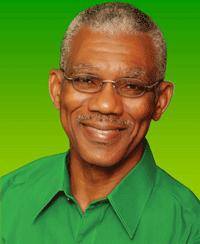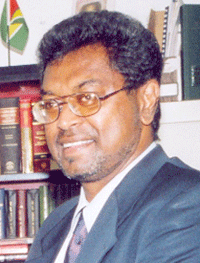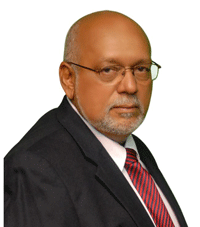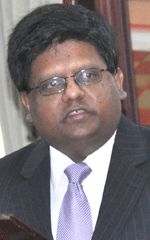– Ramjattan/Granger ‘dance’
GUYANA’S opposition parliamentary parties, APNU and the AFC, remain in a triumphal mood over their combined success last month in slashing G$21 billion off the 2012 national budget. And, separately, the President Donald Ramotar-led administration and the private sector continue to lament the serious consequences for the future social and economic  development of this nation, by what’s also being perceived as a most injudicious—the government says “vindictive” — resort to a majority-of-one vote in the 65-member parliament.
development of this nation, by what’s also being perceived as a most injudicious—the government says “vindictive” — resort to a majority-of-one vote in the 65-member parliament.
Jeopardised by a virtual ‘slash-and-burn’ approach to budgetary cuts are high-profile development schemes like the internationally welcomed Low-Carbon Development Strategy (LCDS)– identified with Guyana’s involvement in coping with the phenomenon of climate change — and the Amaila Falls Hydropower Project. Both are designed to give Guyana a cutting edge in economic diversification and transformation with involvement of major international financing.
What the AFC’s chairman and primary spokesman for the party’s seven seats in the National Assembly, Khemraj Ramjattan, has surprisingly categorised as “collateral damage” in the wielding of the opposition’s budgetary cuts, the local labour movement—divided as it is—recognise as serious job losses in the public sector, and with spiralling effect as the dust settles on the way forward.
On the other side of the coalition alliance, APNU’s leader David Granger, by comparison and temperament more careful than Ramjattan in his public pronouncements, was to indulge in surprising language during his post-budget appearance on a television programme, when he opted to brag of their intention to demonstrate to the government the “power” of one they have in the parliament.
Both Granger and Ramjattan would, however, be aware that given the historical post-independence political and cultural developments in Guyana, and the vicissitudes of electioneering politics in a democratic State, their “celebration” of last month’s knife-wielding budget cuts could well prove a pyrrhic victory.
Cabinet Secretary and Head of the Presidential Secretariat, Dr Roger Luncheon has already announced that the government would soon make public their presentation to the parliamentary opposition of the negative impact the budget cuts would have for workers and the national economy.
Once the cuts, as wielded by the opposition during the budget debate, remain on the books up to Tuesday, May 8 for wages and salaries this month, then the Finance Minister (Dr Ashni Singh) would provide his assessment of how many workers could be on the “breadline”.
Singh) would provide his assessment of how many workers could be on the “breadline”.
Supplementary budget?
The AFC’s Ramjattan was to gratuitously speak of how hard the opposition strove to ensure “we leave something for them (the workers now facing retrenchment)” in carelessly baring his notion of “collateral damage” when they went on a chopping spree against some categories of public sector employees during the budget debate.
Now, while Granger, as Opposition Leader, has declared plans for initiating a “supplementary budget” with hopes of giving, as he said, the Guyanese people “a good life they deserve (is this fun politics?)”, his AFC partner, Ramjattan, has raised another issue that again exposes the weakness of the nature of their shared anti-government alliance; this time it relates to composition of the Guyana Elections Commission (GECOM) on which the AFC figures that, given the nature of their post-election ‘accommodation’, it should have one of its own among the three opposition nominees on the Commission.
But APNU–which basically is dominated by the PNCR that had opted against registering to contest last November’s general election under its own name, as if in doubts about its leadership credential—chose to fill a vacancy with another known PNC representative, Sandra Jones.
Perhaps Ramjattan’s expressed hope that this would have been the case, after the extent of the AFC/APNU collaboration in slashing GUY$21B from the 2012 budget, may have been influenced by “success” (sic) achieved in getting Granger to somersault on a compromise ag the electricity tariff for Linden.
AFC’s GECOM bid
No sooner had the Hinds-Granger agreement (that included other issues, such as TV licences) been announced, than the AFC accused APNU of a “betrayal”; the APNU leader was to vehemently deny any “selling out” and subsequently went on the political offensive that later manifested in the opposition “unity” in the deep budget cuts.
It is doubtful, at this stage, that there could be another political somersault by APNU to accommodate the AFC with representation on GECOM. For one thing, it is not a matter that entirely rests with Granger. It may have been politically expedient to risk backing off on the agreement with PM Hinds for an appeasement to Lindeners. Doing the somersault again, within a short period, now on GECOM representation, does not seem practical, with credibility already a diminishing commodity for APNU.
What the APNU/AFC coalition brings to the table is a shared passion, if not hatred, for governance by the PPP/C. Maintaining such politicking for a long haul could be as risky as making it compelling for President Ramotar to dissolve parliament for a sudden snap general election.


.jpg)











